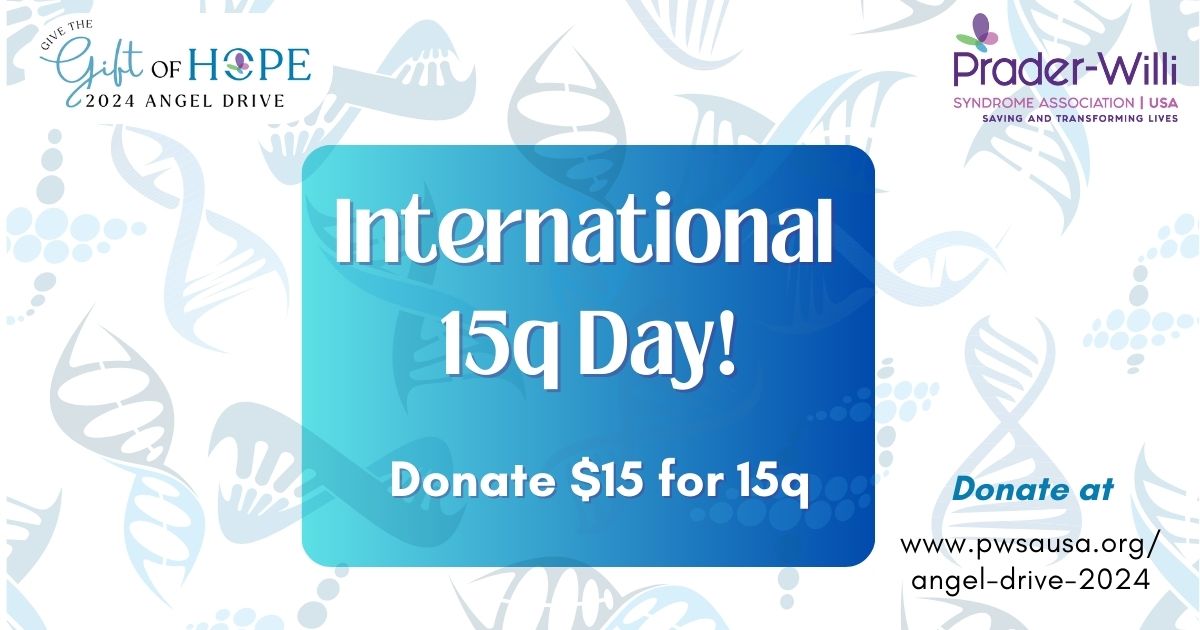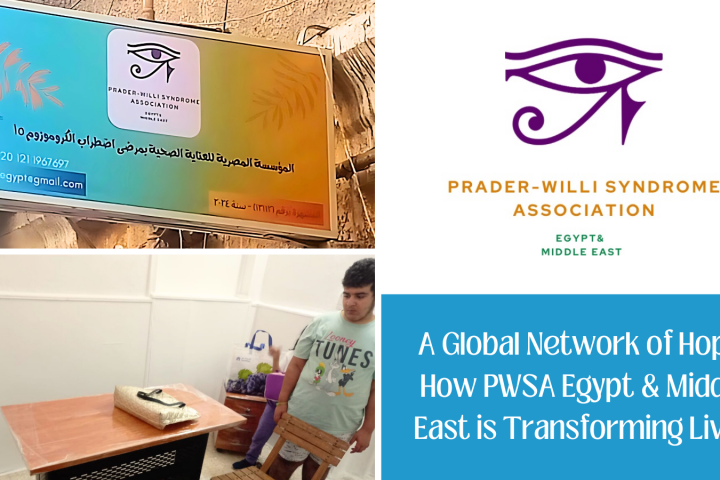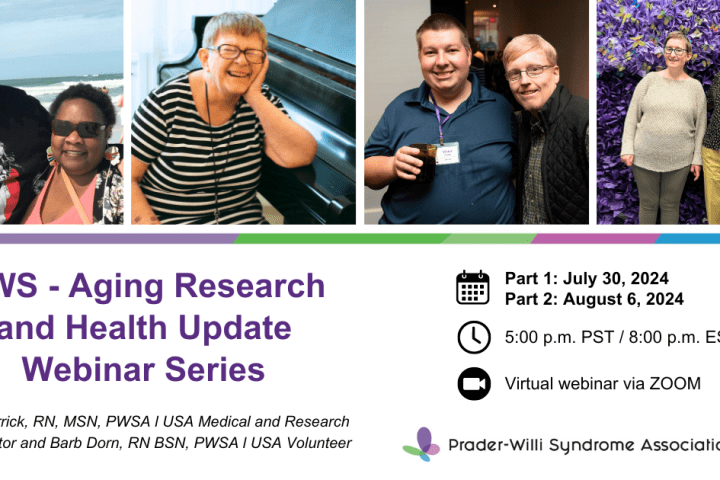International 15q Day
If you’ve been in the Prader-Willi syndrome (PWS) community for a while, then you likely know that PWS is a rare genetic disorder caused by an abnormality with the 15th chromosome. International 15q Day is a day to bring awareness to PWS along with two other syndromes caused by abnormalities in the same section of the 15th chromosome, Angelman syndrome and Dup15q syndrome. Below is a brief explanation of all three disorders to help raise awareness about this category of genetic disorders.
Prader-Willi Syndrome
There are 3 genetic subtypes of PWS.
Deletion: The most common cause of PWS, accounting for about 70% of cases, is a paternal chromosomal deletion on chromosome 15.
Maternal Uniparental Disomy: Accounts for about 25% of cases. This occurs when a child inherits two copies of chromosome 15 from the mother and none from the father, resulting in the absence of the critical paternal genes.
Imprinting Mutation: Accounts for less than 3% of cases, where there is an imprinting mutation on the father’s chromosome 15. The genetic material is there but remains inactive.
Some characteristics of PWS include failure-to-thrive in infancy, hypotonia, developmental delays, behavior issues, sleep disturbances, anxiety, and hyperphagia (constant hunger). While there is no cure for PWS, there is a growing body of treatment options to help reduce symptoms of PWS, including one approved medication, growth hormone, a widely used intervention to help with short stature, physical development, and improvement in body composition by decreasing the fat mass and increasing lean body mass.
Angelman Syndrome
UBE3A is the Angelman syndrome gene on the 15th chromosome. “In typical humans, the UBE3A gene from our father is silent and the UBE3A gene from our mother helps our brain develop. However, in individuals with Angelman syndrome, there is a problem with the UBE3A gene from the mother and the brain cannot get the information it needs to develop and control speech, movement and learning.” (Symptoms and Causes – Angelman Syndrome Foundation)
Some characteristics of Angelman syndrome are hypotonia, developmental delays, seizures, sleep problems, lack of speech, abnormal food-related behaviors, anxiety, behavior issues, and a distinctly happy demeanor. There is no known cure for Angelman syndrome, but therapeutic interventions can help with development and learning and specific characteristics like seizures and gastrointestinal issues can be treated.
Dup15q Syndrome
Chromosome 15q11.2-13.1 duplication syndrome, often shortened to Dup15q syndrome, occurs when there is at least one extra chromosome 15 region (q11.2 – q13.1) present. “These duplications most commonly occur in one of two forms. These include an extra isodicentric 15 chromosome, abbreviated idic(15), or an interstitial duplication 15, abbreviated int dup(15).” (Understanding Dup15q Syndrome – Dup15Q Alliance) Maternal isodicentric chromosome 15 accounts for 60-80% of diagnoses, while Maternal interstitial duplication accounts for 20-40% of diagnoses. (Today is International 15q Day)
Similar to PWS and Angelman, characteristics include hypotonia, sleep disturbances, gastrointestinal issues, and intellectual disabilities. They may also include autism spectrum disorder, epilepsy, and distinct facial features. There is no known cure and treatment options focus on specific symptoms and interventions for developmental delays.
Support Research and Awareness
Organizations for Angelman syndrome and Dup15q syndrome have created a database of information to help doctors and researchers more effectively and efficiently treat patients and find treatment options for these rare disorders. You can learn more about LADDER (Linking Angelman and Dup15q Data for Expanded Research) at LADDER – Angelman Syndrome Foundation
Organizations like PWSA | USA support research initiatives in the PWS community and openly advocate for more treatment options. You can help support these research endeavors and advocacy efforts, as well as our family support outreach by donating to PWSA | USA.
Donate $15 for 15q!
In honor of International 15q Day, we’re asking the PWS community to participate in this awareness effort and help us raise money for our Angel Drive. Donate $15 for International 15q Day! Share with 15 friends and ask them to help support the efforts of PWSA | USA by donating $15 for 15q. Your donation helps support much-needed research, advocacy efforts, and family supports like school trainings, parent mentors, medical advocacy and more! Every amount helps!
To donate $15, whether a one-time donation or recurring, please follow the link below. Click on the “other amount” box and add your intended amount. We are grateful for the support of our community!
Share this!





 Jennifer Bolander has been serving as a Special Education Specialist for PWSA (USA) since October of 2015. She is a graduate of John Carroll University and lives in Ohio with her husband Brad and daughters Kate (17), and Sophia (13) who was born with PWS.
Jennifer Bolander has been serving as a Special Education Specialist for PWSA (USA) since October of 2015. She is a graduate of John Carroll University and lives in Ohio with her husband Brad and daughters Kate (17), and Sophia (13) who was born with PWS. Perry A. Zirkel has written more than 1,500 publications on various aspects of school law, with an emphasis on legal issues in special education. He writes a regular column for NAESP’s Principal magazine and NASP’s Communiqué newsletter, and he did so previously for Phi Delta Kappan and Teaching Exceptional Children.
Perry A. Zirkel has written more than 1,500 publications on various aspects of school law, with an emphasis on legal issues in special education. He writes a regular column for NAESP’s Principal magazine and NASP’s Communiqué newsletter, and he did so previously for Phi Delta Kappan and Teaching Exceptional Children. Evan has worked with the Prader-Willi Syndrome Association (USA) since 2007 primarily as a Crisis Intervention and Family Support Counselor. Evans works with parents and schools to foster strong collaborative relationships and appropriate educational environments for students with PWS.
Evan has worked with the Prader-Willi Syndrome Association (USA) since 2007 primarily as a Crisis Intervention and Family Support Counselor. Evans works with parents and schools to foster strong collaborative relationships and appropriate educational environments for students with PWS. Dr. Amy McTighe is the PWS Program Manager and Inpatient Teacher at the Center for Prader-Willi Syndrome at the Children’s Institute of Pittsburgh. She graduated from Duquesne University receiving her Bachelor’s and Master’s degree in Education with a focus on elementary education, special education, and language arts.
Dr. Amy McTighe is the PWS Program Manager and Inpatient Teacher at the Center for Prader-Willi Syndrome at the Children’s Institute of Pittsburgh. She graduated from Duquesne University receiving her Bachelor’s and Master’s degree in Education with a focus on elementary education, special education, and language arts. Staci Zimmerman works for Prader-Willi Syndrome Association of Colorado as an Individualized Education Program (IEP) consultant. Staci collaborates with the PWS multi-disciplinary clinic at the Children’s Hospital in Denver supporting families and school districts around the United States with their child’s Individual Educational Plan.
Staci Zimmerman works for Prader-Willi Syndrome Association of Colorado as an Individualized Education Program (IEP) consultant. Staci collaborates with the PWS multi-disciplinary clinic at the Children’s Hospital in Denver supporting families and school districts around the United States with their child’s Individual Educational Plan. Founded in 2001, SDLC is a non-profit legal services organization dedicated to protecting and advancing the legal rights of people with disabilities throughout the South. It partners with the Southern Poverty Law Center, Protection and Advocacy (P&A) programs, Legal Services Corporations (LSC) and disability organizations on major, systemic disability rights issues involving the Individuals with Disabilities Education Act (IDEA), Americans with Disabilities Act (ADA), and the federal Medicaid Act. Recently in November 2014, Jim retired.
Founded in 2001, SDLC is a non-profit legal services organization dedicated to protecting and advancing the legal rights of people with disabilities throughout the South. It partners with the Southern Poverty Law Center, Protection and Advocacy (P&A) programs, Legal Services Corporations (LSC) and disability organizations on major, systemic disability rights issues involving the Individuals with Disabilities Education Act (IDEA), Americans with Disabilities Act (ADA), and the federal Medicaid Act. Recently in November 2014, Jim retired.